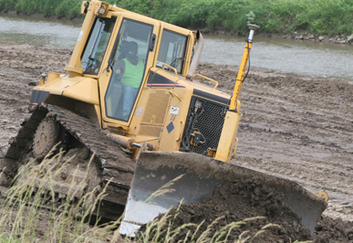February 14, 2014
Innovation of the Month: Three-Dimensional Modeling
Although three-dimensional modeling is widely used in other industries, its potential to increase productivity, quality and efficiency in highway construction is just now being realized. Through Every Day Counts, the Federal Highway Administration is encouraging a transition from traditional two-dimensional design to 3-D modeling.
Many in the U.S. highway industry are using 3-D modeling because of its benefits:
- Faster project completion with improved quality: GPS-enabled construction equipment with guidance from 3-D model data can achieve accurate grades on the first pass.
- Significant productivity increases: Contractors estimate as much as a 15 to 30 percent increase in productivity on projects.
- Reduction of manual tasks: With GPS machine control, many manual tasks, such as staking and stringing lines, can be done automatically and with great precision.
- Enhanced safety: The reduced number of workers needed on-site during a construction project increases safety.
Registration is still open for FHWA’s February 19 webinar on applications of 3-D models in the construction office.
Foxx Tours Florida Project
 U.S. Transportation Secretary Anthony Foxx visited the 95 Express project in Fort Lauderdale, Fla. The $112 million design-build project is converting high-occupancy vehicle lanes into variable toll lanes for 43 miles from downtown Miami through Fort Lauderdale into Palm Beach County. The project’s second phase through Fort Lauderdale, which received American Recovery and Reinvestment Act funds, is expected to be finished later this year. During his late January visit, Foxx discussed the importance of creating jobs, accelerating project delivery and improving the nation’s infrastructure to lessen the amount of time drivers spend in heavy traffic.
U.S. Transportation Secretary Anthony Foxx visited the 95 Express project in Fort Lauderdale, Fla. The $112 million design-build project is converting high-occupancy vehicle lanes into variable toll lanes for 43 miles from downtown Miami through Fort Lauderdale into Palm Beach County. The project’s second phase through Fort Lauderdale, which received American Recovery and Reinvestment Act funds, is expected to be finished later this year. During his late January visit, Foxx discussed the importance of creating jobs, accelerating project delivery and improving the nation’s infrastructure to lessen the amount of time drivers spend in heavy traffic.
Louisiana Launches Responder Training Initiative
The Louisiana State Police, in conjunction with the Louisiana Department of Transportation and Development and the Louisiana Office of State Fire Marshal, announced the start of a state traffic incident management training initiative at a February 4 news conference. Members of the state’s first traffic incident management train-the-trainer class, conducted by FHWA, attended the media event. A Traffic Incident Management Training Committee has been formed and instructors have begun scheduling training workshops across the state. The committee’s goal is to conduct at least 18 workshops a month over the next year.
Maryland Conference Features EDC Technology
An FHWA-led session on high-friction surface treatments was on the agenda of the 2014 Maryland Quality Initiative Conference. The theme of the February 12 and 13 event in Baltimore was “Delivering on Maryland’s Transportation Investment.” FHWA representatives also planned to present Partner Quality Awards to recipients who have made noteworthy contributions in delivering the Federal-Aid Highway Program. More than 600 people registered for the conference.
First Montana Local Public Agency Certified
The Montana Department of Transportation certified Missoula County for the design phase of the Maclay Bridge project west of Missoula. It’s the first locally administered Federal-Aid project certification the Montana DOT has given. The agency has updated its Local Public Agency Certification Guide so that more local agencies can use the flexibilities provided by certification. FHWA worked with the agency on the certification guide update.
New Mexico Team Studies Utah Interchanges
Staff from the New Mexico Department of Transportation and FHWA traveled to Orem, Utah, in January to learn about the Utah Department of Transportation’s construction of diverging diamond interchanges. The New Mexico team is considering a DDI for an interchange project at I-25 and Cerrillos Road in Santa Fe. The group met with Utah DOT staff to discuss lessons learned and best practices on designing and constructing DDIs and observed DDIs built in various configurations.


